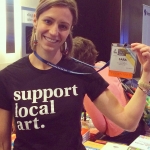
Chris Appleton
Sharing Is Caring: If I Truly Care, I Will Practice Shared Decision Making Structures
Posted by Mar 15, 2016

Chris Appleton
“Every artist was first an amateur” – Ralph Waldo Emerson
When invited to write a blog response to the Hewlett Foundation report on arts leadership, I jumped at the opportunity. Along with my professional and civic interest in advancing leadership models that work across various lines of social difference, it is a topic around which I have feelings and thoughts.
As a 33-year-old executive director of an organization I co-founded while in college, who has no academic training in arts administration and has only held one job as an adult, I read the Moving Arts Leadership Forward report as timely for my career and interests. I can say with candor and hope that it is my desire to remain as the leader of WonderRoot for decades to come—but I would only dream of this so long as my leadership continues to advance the mission of the organization and the people it seeks to serve.
Read More












